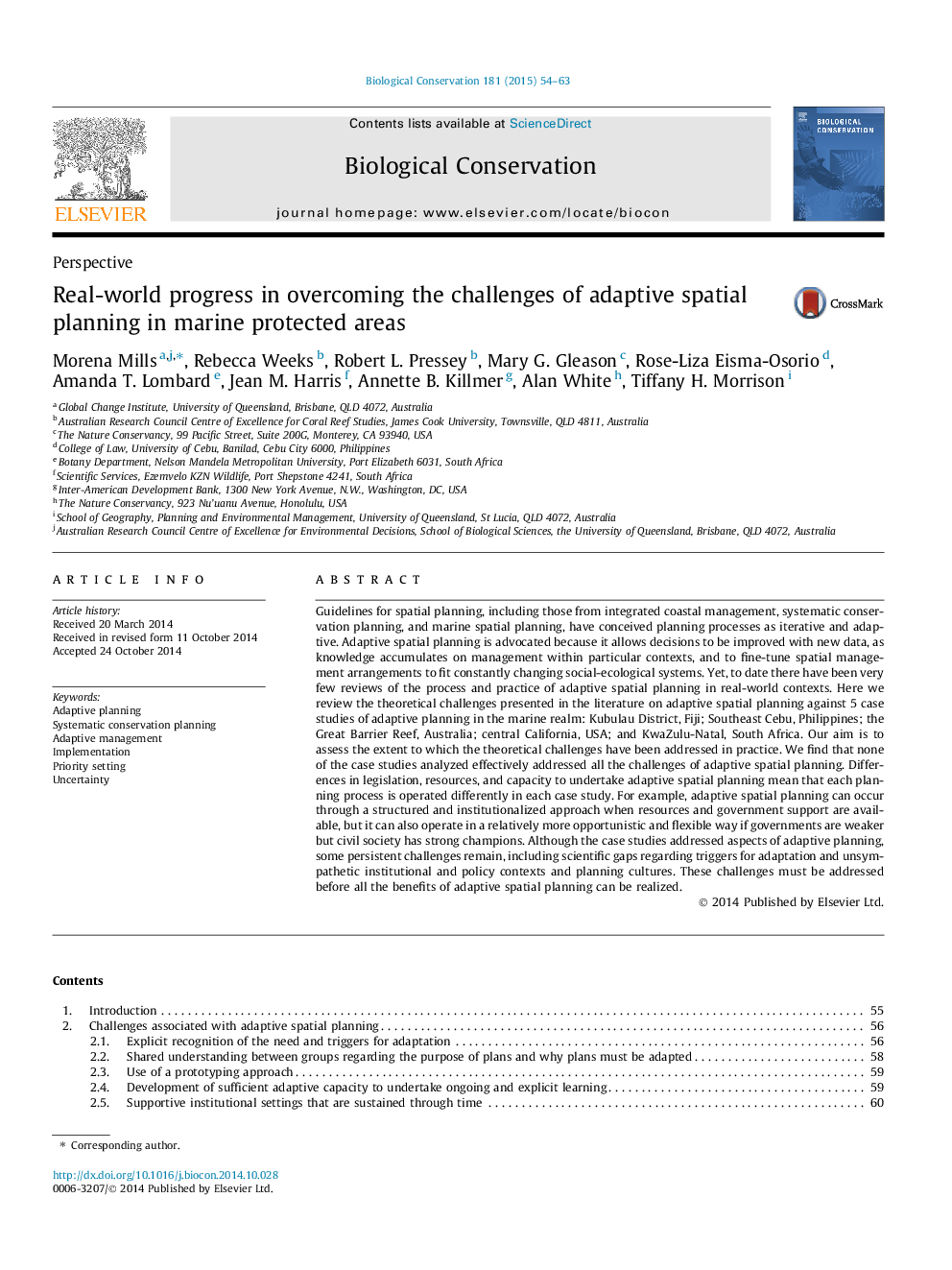| کد مقاله | کد نشریه | سال انتشار | مقاله انگلیسی | نسخه تمام متن |
|---|---|---|---|---|
| 6299360 | 1617920 | 2015 | 10 صفحه PDF | دانلود رایگان |
عنوان انگلیسی مقاله ISI
Real-world progress in overcoming the challenges of adaptive spatial planning in marine protected areas
ترجمه فارسی عنوان
پیشرفت دنیای واقعی در غلبه بر چالش های برنامه ریزی فضایی سازگار در مناطق حفاظت شده دریایی
دانلود مقاله + سفارش ترجمه
دانلود مقاله ISI انگلیسی
رایگان برای ایرانیان
کلمات کلیدی
برنامه ریزی سازگار، برنامه ریزی حفاظت منظم، مدیریت انطباقی پیاده سازی، تعیین اولویت، عدم قطعیت،
موضوعات مرتبط
علوم زیستی و بیوفناوری
علوم کشاورزی و بیولوژیک
بوم شناسی، تکامل، رفتار و سامانه شناسی
چکیده انگلیسی
Guidelines for spatial planning, including those from integrated coastal management, systematic conservation planning, and marine spatial planning, have conceived planning processes as iterative and adaptive. Adaptive spatial planning is advocated because it allows decisions to be improved with new data, as knowledge accumulates on management within particular contexts, and to fine-tune spatial management arrangements to fit constantly changing social-ecological systems. Yet, to date there have been very few reviews of the process and practice of adaptive spatial planning in real-world contexts. Here we review the theoretical challenges presented in the literature on adaptive spatial planning against 5 case studies of adaptive planning in the marine realm: Kubulau District, Fiji; Southeast Cebu, Philippines; the Great Barrier Reef, Australia; central California, USA; and KwaZulu-Natal, South Africa. Our aim is to assess the extent to which the theoretical challenges have been addressed in practice. We find that none of the case studies analyzed effectively addressed all the challenges of adaptive spatial planning. Differences in legislation, resources, and capacity to undertake adaptive spatial planning mean that each planning process is operated differently in each case study. For example, adaptive spatial planning can occur through a structured and institutionalized approach when resources and government support are available, but it can also operate in a relatively more opportunistic and flexible way if governments are weaker but civil society has strong champions. Although the case studies addressed aspects of adaptive planning, some persistent challenges remain, including scientific gaps regarding triggers for adaptation and unsympathetic institutional and policy contexts and planning cultures. These challenges must be addressed before all the benefits of adaptive spatial planning can be realized.
ناشر
Database: Elsevier - ScienceDirect (ساینس دایرکت)
Journal: Biological Conservation - Volume 181, January 2015, Pages 54-63
Journal: Biological Conservation - Volume 181, January 2015, Pages 54-63
نویسندگان
Morena Mills, Rebecca Weeks, Robert L. Pressey, Mary G. Gleason, Rose-Liza Eisma-Osorio, Amanda T. Lombard, Jean M. Harris, Annette B. Killmer, Alan White, Tiffany H. Morrison,
